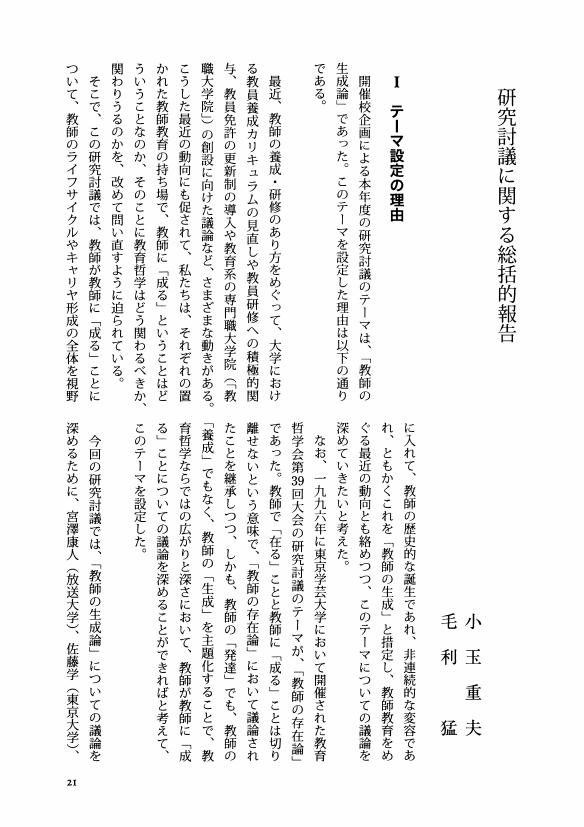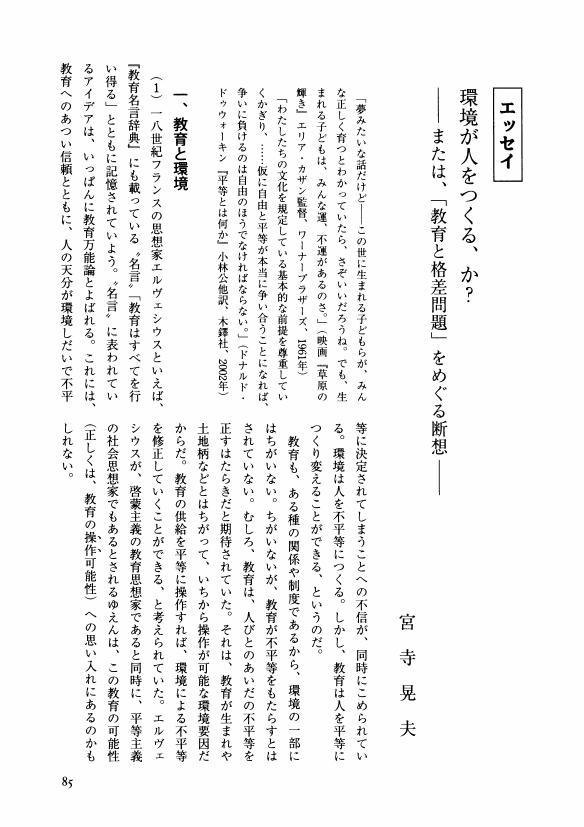1 0 0 0 OA 研究討議に関する総括的報告
- 著者
- 小玉 重夫 毛利 猛
- 出版者
- 教育哲学会
- 雑誌
- 教育哲学研究 (ISSN:03873153)
- 巻号頁・発行日
- vol.2006, no.93, pp.21-27, 2006-05-10 (Released:2009-09-04)
1 0 0 0 OA 遺伝・自然・教育-行動遺伝学から
- 著者
- 安藤 寿康
- 出版者
- 教育哲学会
- 雑誌
- 教育哲学研究 (ISSN:03873153)
- 巻号頁・発行日
- vol.2006, no.93, pp.28-32, 2006-05-10 (Released:2009-09-04)
- 参考文献数
- 3
1 0 0 0 OA 心理療法と教育における魂-否定性として
- 著者
- 河合 俊雄
- 出版者
- 教育哲学会
- 雑誌
- 教育哲学研究 (ISSN:03873153)
- 巻号頁・発行日
- vol.2006, no.93, pp.33-36, 2006-05-10 (Released:2009-09-04)
1 0 0 0 OA 「教育にとっての心・生命」をめぐる試論-教育学の「しっぽ」を探る
- 著者
- 鈴木 晶子
- 出版者
- 教育哲学会
- 雑誌
- 教育哲学研究 (ISSN:03873153)
- 巻号頁・発行日
- vol.2006, no.93, pp.37-42, 2006-05-10 (Released:2009-09-04)
1 0 0 0 OA 総括的報告
- 著者
- 高橋 勝 舟山 俊明
- 出版者
- 教育哲学会
- 雑誌
- 教育哲学研究 (ISSN:03873153)
- 巻号頁・発行日
- vol.2006, no.93, pp.43-48, 2006-05-10 (Released:2009-09-04)
1 0 0 0 OA マルクスにおける「教育学的」意識の清算 マックス・シュティルナー批判を手がかりとして
- 著者
- 青柳 宏幸
- 出版者
- 教育哲学会
- 雑誌
- 教育哲学研究 (ISSN:03873153)
- 巻号頁・発行日
- vol.2006, no.93, pp.49-66, 2006-05-10 (Released:2010-05-07)
- 参考文献数
- 29
The purpose of this paper is to clarify the distinctive features of Karl Marx's educational thought. Many studies on Marx fail to distinguish Marxism from Marx. However, Marx's thought is different from Marxism and has distinctively historical meanings. This paper pays attention to Marx's criticism of Max Stirner in “Die deutsche Ideologie”. Because Stirner developed the criticism of pedagogy in “Der Einzige und sein Eigentum”, Marx's educational thought can be reconstructed by means of Marx's criticism of Stirner.Stirner assumed that the rule of the spirit by the concept of “Man” was a distinctive feature of modernity and that education was its means. He criticized the suppression of the individual by “Man”. Before Stirner's book was published Marx had envigioned “Communism as the real appropriation of the human essence by and for man”. Stirner' s criticism turned out to match this Vision of communism and awakened Marx from philosophical consciousness. Marx thus stopped regarding the human essence as the assumption of the discussion and came to understand it as “the ensemble of social relations” based on the materialistic view of history. He called the refusal of this human essence theory the settlement of account with philosophical conscience. Because Stirner's pedagogy was based upon the assumption of the human essence, it can be considered that the settlement of account with philosophical conscience implied the settlement of account with pedagogical conscience. Marx changed the way of viewing pedagogy of terms of the human essence theory by explaining how such an idea as “Man” was abstracted from material relations.
- 著者
- 生澤 繁樹
- 出版者
- 教育哲学会
- 雑誌
- 教育哲学研究 (ISSN:03873153)
- 巻号頁・発行日
- vol.2006, no.93, pp.67-84, 2006-05-10 (Released:2010-05-07)
- 参考文献数
- 48
This paper examines Charles Taylor's idea of self-becoming in his cultural-pluralistic philosophy with a focus on his “anti-naturalistic” notion of the self. Although Taylor and his essay “The Politics of Recognition” have been introduced as the philosophy of multiculturalism or communitarianism in contemporary educational studies, it is not well understood that his cultural-pluralistic ideas are inspired, influenced and invoked by his sympathy with modern Romanticism and antipathy against modern naturalism concerning the concept of self-understanding. I characterize his philosophy of self-becoming as “anti-naturalism” and attempt to clarify his contributions to education including multicultural education.First, this paper conducts an analysis of Taylor's original notion of the “selfinterpreting” self with reference to his stance against modern natural sciences of man. Through this examination, we recognize that Taylor proposes the dialogical and hermeneutic notion of the self or self-becoming against the disengaged, neutral, or atomistic view of the self in natural sciences.Second, I present his “anti-naturalistic” philosophy of self-becoming as one based upon his positive evaluation of the ideas of individuality and authenticity in modern Romanticism. This is a view that an individual self is constituted by language and hence embedded in community, culture and history. I argue that the Romantic idea of the self is central to his “anti-naturalist” interpretation of the self as he views Romanticism as a reactionary movement against the analytic science of man in Enlightenment.Finally, as Taylor claims that the world of education is the main locus of multiculturalism, I examine his contribution to education including multicultural education. The conclusion runs as follows : Taylor's “anti-naturalistic” philosophy suggests the possibilities of multicultural education for us to rethink modern education from the standpoint of his Romantic appreciation of the originality of the individual and culture, while at the same time his philosophy has difficulties precisely because of that position.
- 著者
- 宮本 健市郎
- 出版者
- 教育哲学会
- 雑誌
- 教育哲学研究 (ISSN:03873153)
- 巻号頁・発行日
- vol.2005, no.92, pp.117-124, 2005-11-10 (Released:2009-09-04)
二〇〇二年の学習指導要領によって導入されたばかりの総合的な学習の時間 (総合学習) が危機に瀕している。総合学習を学力低下と直結させる思考の短絡さをあらためて論ずる必要はないだろう。だが、そのような短絡的な発想にもとついて教育政策が進められている現実を見ると、一世紀以上をかけて作り上げられてきた総合学習の理論が一般には理解されていないことを痛感させられる。この点で研究者の努力の不足は認めざるをえない。このような時に、キルパトリックの教育思想にかんする日本で初めての本格的な研究書が公刊されたことの意義は大きい。言うまでもなく、キルパトリックは、アメリカ進歩主義教育の中でデューイに次いで重要な思想家であり、教育実践上の指導的立場にあった。彼の開発したプロジェクト.メソッドは総合学習の典型であり、大正期から昭和初期に構案法として、我が国でも実施されたことは周知のことである。にもかかわらず、彼に対する評価はわが国では必ずしも高くない。彼の思想はデューイ理論の通俗化とみなされ、プロジェクト・メソッドの実践は反知性主義として批判されることが多い。彼の思想の本格的な研究がほとんどなされないままに、低い評価が与えられ続けてきたのが実情ではなかっただろうか。佐藤隆之氏は、先行研究を丹念に参照しながら、キルパトリックのプロジェクト・メソッド論に焦点を絞って、キルパトリックの思想とプロジェクト・メソッドの論理を解明する。そして、「理想への投企」として、プロジェクト・メソッドの意義を見出すのである。著者はプロジェクト・メソッドを現代の総合学習に直結させて論じてはいないが、プロジェクト・メソッドは現代の総合学習の一つのモデルであるから、著者がプロジェクト・メソッドの可能性を明示したことは、著者の意図を超えて、総合学習を否定しようとする日本の現状にたいする批判にもなっている。その意味では、本書は現状への問題提起の書であり、総合学習に関心をもつ人々には待望の書である。
1 0 0 0 OA 今井康雄著『メディアの教育学-「教育」の再定義のために』
- 著者
- 森田 伸子
- 出版者
- 教育哲学会
- 雑誌
- 教育哲学研究 (ISSN:03873153)
- 巻号頁・発行日
- vol.2005, no.92, pp.125-133, 2005-11-10 (Released:2009-09-04)
1 0 0 0 OA 岡田敬司著『「自律」の復権-教育的かかわりと自律を育む共同体』
- 著者
- 山口 匡
- 出版者
- 教育哲学会
- 雑誌
- 教育哲学研究 (ISSN:03873153)
- 巻号頁・発行日
- vol.2005, no.92, pp.134-135, 2005-11-10 (Released:2009-09-04)
1 0 0 0 OA 宇佐美寛著『大学授業の病理-FD批判-』
- 著者
- 田中 毎実
- 出版者
- 教育哲学会
- 雑誌
- 教育哲学研究 (ISSN:03873153)
- 巻号頁・発行日
- vol.2005, no.92, pp.136-137, 2005-11-10 (Released:2009-09-04)
- 著者
- 石橋 哲成
- 出版者
- 教育哲学会
- 雑誌
- 教育哲学研究 (ISSN:03873153)
- 巻号頁・発行日
- vol.2005, no.92, pp.138-140, 2005-11-10 (Released:2009-09-04)
1 0 0 0 OA 専門家の見識を育てる教師教育カリキュラムの認識論的基礎
- 著者
- 佐藤 学
- 出版者
- 教育哲学会
- 雑誌
- 教育哲学研究 (ISSN:03873153)
- 巻号頁・発行日
- vol.2006, no.93, pp.1-6, 2006-05-10 (Released:2009-09-04)
- 参考文献数
- 4
1 0 0 0 OA 〈教師〉というペルソナの誕生と死と転生-〈共同体〉論の視点から
- 著者
- 宮澤 康人
- 出版者
- 教育哲学会
- 雑誌
- 教育哲学研究 (ISSN:03873153)
- 巻号頁・発行日
- vol.2006, no.93, pp.7-13, 2006-05-10 (Released:2010-05-07)
- 参考文献数
- 15
1 0 0 0 OA 戦争と教育 フーコーからプラトンへ
- 著者
- 加藤 守通
- 出版者
- 教育哲学会
- 雑誌
- 教育哲学研究 (ISSN:03873153)
- 巻号頁・発行日
- vol.2005, no.92, pp.1-21, 2005-11-10 (Released:2009-09-04)
- 参考文献数
- 17
The aim of this article is to show the hidden relationship between war and education in the history of Western thought.In the first chapter we examine and evaluate a thesis developed by Michel Foucault in his lecture at Collège de France, Il faut défendre la société, originally held in 1976 but first published in 1997. According to this thesis, the idea of the struggle between opposing 'nations' or 'societies' within a country, such as between the Normans and the Saxons in England or between the Francs and the Gauls in France played an important role in the formation of modern political and historical thought including Nazism and Stalinism. This thesis can have strong impact to our understanding of modern education.In the second chapter we examine the classical theory of education represented by Plato's paideia and show the crucial role played by war in this theory. For it is only by comparing the soul with a state (polis) divided by the strife between different classes, that Plato was capable of developing his theory of the inner self. The result is of special interest, because Foucault himself viewed Plato as the arch-enemy of the 'historicism' which stand on the side of the above-mentioned modern theory of war.Thus, it is not only in the modern educational thought but also in the classical theory of paideia that war played an important role.
1 0 0 0 OA 戦争と教育-教育の責任をめぐって-
- 著者
- 増渕 幸男
- 出版者
- 教育哲学会
- 雑誌
- 教育哲学研究 (ISSN:03873153)
- 巻号頁・発行日
- vol.2005, no.92, pp.22-39, 2005-11-10 (Released:2009-09-04)
- 参考文献数
- 20
The twentieth century was a century of war. Despite the passionate longing for peace, and the vigorous efforts of many throughout the world community to attain it, war continues to be a part of the human condition. As political efforts to bring an end to war have had few results, humankind has placed its hopes for a world without war on education, hoping that through education the world can raise generations of peaceloving young people who will oppose war. After the Second World War, the charter of UNESCO clearly set out a road to peace and charged educators with a major role in achieving that goal. In spite of all of our good intentions, however, war continues to plague our contemporary world.As members of the human race we cannot ignore what seems to be an element of human nature that leads to continuous movements that repeat the cycle of “want-seek-struggle-disorder”. Should we then recognize the potential for evil as a part of human nature? Yes, I believe that evil itself is a part of the essential nature of human beings. That being the case, I would argue that : 1. Education was also implicated in the crime of war, 2. Education plays a role in fomenting war.Education not only imparts knowledge of the good; it also has taught methods of war. We can see this in the fact that as societies become “more civilized”, they also raise the making of war to new levels. We also must acknowledge the fact that religion is also involved in conflicts between nations, and that many wars take place against the background of religious disagreements. As both religion and education are concerned with the formation of the spirit, the relationship between war and religion is a complex one that education has difficulty resolving.War is a crime against humanity, and moreover necessarily causes spiritual loss. Education is also caught in a contradiction : opposing violence, and at the same time participating in war. If we cannot resolve the paradox between the two, then how can we call for accountability from education? This paper will consider these complex questions and offer some useful suggestions.
1 0 0 0 OA 《大人》になること/《大人》であることの可能性 超越論的な〈大人〉の失効を越えて
- 著者
- 田中 裕喜
- 出版者
- 教育哲学会
- 雑誌
- 教育哲学研究 (ISSN:03873153)
- 巻号頁・発行日
- vol.2005, no.92, pp.59-76, 2005-11-10 (Released:2010-05-07)
- 参考文献数
- 31
It has been self-evidently assumed that children would grow to adulthood through the participation in the adult community. But we can't do so any longer, because the young today have been unsable to feel actually themselves adults beyond twenty years of age. The main purpose of this paper is to clarify what our becoming/being “Adult” means in a social and ethical sense at the present day.To begin with, we will analyze the mechanism that children heretofore became adult by constructing the transcendental 'Adult' through the interaction of experiential world and conforming themselves to the transcendental 'Adult' as 'the privileged other restored norms.'Secondly, we will grasp the modern conditions under which we have sought for universal and inclusive norms exhaustively, with the result that the transcendental 'Adult' has emptied, this mechanism has lapsed, and we have faced the difficulty in growing to adulthood.Finally, we will find out the new way we extricate ourselves from the present blockade and attain becoming/being 'Adult' in the different way from constructing the transcendental 'Adult' as ever. Then, we will suggest that we give up persisting the identity of the self, accept the contingency and changeability of the self actively, and open up the possibilities of communication between ourselves and the other with whom we don't share norms.
1 0 0 0 OA 教育学の「個人化」はいかにしてはじまったのか
- 著者
- 森田 尚人
- 出版者
- 教育哲学会
- 雑誌
- 教育哲学研究 (ISSN:03873153)
- 巻号頁・発行日
- vol.2005, no.92, pp.96-114, 2005-11-10 (Released:2009-09-04)
1 0 0 0 OA 教育哲学を考える
- 著者
- 田中 智志
- 出版者
- 教育哲学会
- 雑誌
- 教育哲学研究 (ISSN:03873153)
- 巻号頁・発行日
- vol.2005, no.92, pp.115-116, 2005-11-10 (Released:2009-09-04)
1 0 0 0 OA 環境が人をつくる, か? または, 「教育と格差問題」をめぐる断想
- 著者
- 宮寺 晃夫
- 出版者
- 教育哲学会
- 雑誌
- 教育哲学研究 (ISSN:03873153)
- 巻号頁・発行日
- vol.2005, no.91, pp.85-101, 2005-05-10 (Released:2010-01-22)
- 参考文献数
- 9













